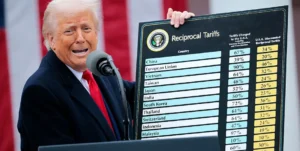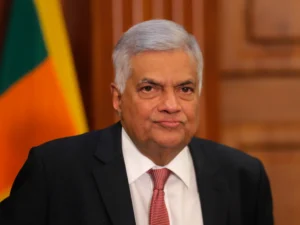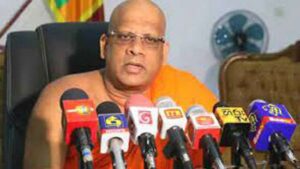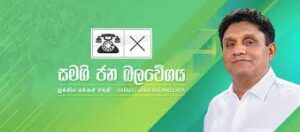
Sri Lanka Faces Trade Pressure, Political Shocks, and Reforms
- CNL Reporter
- July 27, 2025
- Weekly Political Review
- Easter probe, US tariffs
- 0 Comments
Weekly Political Review
Wide Angle focused on : Easter probe, US tariffs, and reforms dominate week
By Rohana Jith
Sri Lanka’s fragile political and economic stability faced fresh tremors this week as the country navigated a volatile mix of external trade pressure, internal political revelations, and intensifying calls for systemic reform.
With just days left until the 1 August deadline for the US to implement a 30% tariff increase on Sri Lankan exports, the government is scrambling to negotiate a reprieve. At the same time, Parliament has been rocked by explosive new details on the 2019 Easter Sunday bombings, further stirring public discontent over delayed justice and alleged cover-ups.

Meanwhile, the government has also formally signaled its intention to introduce a new constitution, as old leadership faces new legal challenges and internal power struggles unfold in the Opposition camp.
High-Stakes US Trade Talks amid Economic Vulnerability
The most immediate threat to Sri Lanka’s economic recovery came in the form of impending US trade tariffs, which could deal a severe blow to key export sectors already under stress. President Anura Kumara Dissanayake (AKD), in a rare direct intervention, held a virtual meeting with US Trade Representative Ambassador Jamieson Greer on Friday (25 July), urging Washington to reconsider the proposed tariff hike.
Unlike regional counterparts who have either secured favorable terms or manageable rates, Sri Lanka—still struggling with post-crisis recovery—could face disproportionate damage. Analysts warn that the proposed 30% tariff increase, atop existing duties, could cripple Sri Lanka’s garment and rubber sectors, worsen the trade deficit, and delay IMF-backed economic stabilization efforts.
In parallel, the government is exploring technical options to import petroleum products from the US as part of a broader strategy to diversify energy sources and strengthen trade ties.
Easter Sunday Attack: Explosive Allegations Shake Parliament

A dramatic twist emerged in Parliament this week when SJB MP and President’s Counsel Nizam Kariapper dropped a political bombshell, revealing what he called a “deliberate suppression of critical evidence” surrounding the 2019 Easter Sunday terror attacks.
Citing a B Report (case no. B 35 882/24) filed at the Colombo Fort Magistrate’s Court in November 2024, Kariapper pointed to damning testimony from whistleblower Asad Maulana—first revealed in Channel 4’s documentary—and corroborated by a WhatsApp message from Father Cyril Gamini, believed to have been shared with the UNHRC.
Kariapper named two key suspects—Sivanesathurai Chandrakanthan (alias Pillayan) and State Intelligence Chief Suresh Salley—as persons of interest, noting that while travel bans had been issued, neither had been questioned or arrested. Even more disturbing were allegations that military intelligence officers had ignored credible tips from a 2015 informant that may have prevented the attacks altogether.
In a fiery statement, Kariapper accused the authorities of shielding senior officers from accountability. “Who is preventing the military intelligence officers from being questioned?” he demanded. “Who is obstructing justice in court?”
He also called out the inclusion of 48 witness statements—spanning civilians, military, police, and prison officials—in the CID file, yet none had made it into the official report. His remarks have reignited public fury over the slow-moving investigation and apparent political interference in justice for the victims.
New Constitution in the Works amid Reform Pledges
Against this backdrop of controversy, Prime Minister Harini Amarasuriya confirmed that the government has initiated steps to draft a new constitution—a promise made during last year’s general election campaign. Responding to a question from Opposition MP Ajith P. Perera, the Premier pledged that the new constitution would be introduced within the government’s current term, following broad public consultation and expert input.
The proposed constitutional overhaul is expected to include reforms to the Constitutional Council and independent commissions, though specific details remain under wraps. Political analysts say this move could help the ruling JVP/NPP consolidate democratic legitimacy, provided it avoids politicization and delivers genuine institutional reform.
Supreme Court Ruling against Former President Wickremesinghe

Adding to the week’s political drama, the Supreme Court ruled that the nationwide state of emergency declared on 17 July 2022 by then-Acting President Ranil Wickremesinghe was unconstitutional. The ruling places Wickremesinghe among five Sri Lankan former Presidents—including Chandrika Kumaratunga, Mahinda Rajapaksa, Maithripala Sirisena, and Gotabaya Rajapaksa—accused of violating the Constitution during their tenures.

Wickremesinghe’s troubles don’t end there. Mihintale Rajamaha Vihara Chief Incumbent Ven. Walahahengunawewa Dhammarathana Thera has lodged a CID complaint alleging the illegal sale of the historic Anula Chethiya in Mihintale for Rs. 300 million, naming Wickremesinghe as a respondent.
While Wickremesinghe has yet to respond publicly to the latest charges, legal experts warn these developments could further tarnish his political legacy and hinder any future political comeback.
Fraud Allegations and Legal Scrutiny of Ministers
Legal scrutiny intensified elsewhere too. The Mount Lavinia Magistrate’s Court last Friday (25) ordered the Fraud Investigation Bureau to obtain statements from Minister Wasantha Samarasinghe, Deputy Minister Mahinda Jayasinghe, and Kaduwela Mayor Ranjan Jayalal in connection with a suspected Rs. 3.6 million fraud. The case involves the alleged lease of land and buildings using forged documentation and is set for further hearing on 22 August.
Opposition in Flux: Leadership Crisis Brewing
Meanwhile, internal rumblings in the Opposition reached a crescendo as reports emerged of a secret meeting involving several Opposition MPs to discuss the party’s waning credibility and need for new leadership.
According to political insiders, names floated for the potential Opposition Leader role included Dayasiri Jayasekara and Harsha de Silva, with some suggesting a fresh, possibly female, face could rejuvenate the Opposition’s image. However, the group unanimously agreed that the new leader should be independent of both Sajith Premadasa and Ranil Wickremesinghe’s influence.
Yet divisions remain. Jayasekara is reportedly under fire for aligning with nationalist sentiments reminiscent of the Rajapaksa era, with critics warning it could alienate progressive voters.

The Samagi Jana Balawegaya (SJB) leadership, however, has dismissed these discussions as rumors, denying any impending change at the top. Nonetheless, the meeting reveals a growing rift within the Opposition ranks that could trigger further fragmentation in the months ahead.
Looking Ahead: Unstable Ground with Crucial Deadlines Looming
With the August 1 US trade tariff deadline fast approaching, the government faces a make-or-break moment on the international trade front. Domestically, the fallout from the Easter attacks investigation, judicial rulings against former leaders, and potential constitutional reform initiatives continue to reshape the country’s political terrain.
Amid these competing priorities, the path forward for Sri Lanka hinges on the leadership’s ability to build trust, pursue justice, and implement genuine reforms—while insulating the economy from external shocks. The coming weeks will test the resilience not just of the government, but of Sri Lanka’s entire political establishment.

